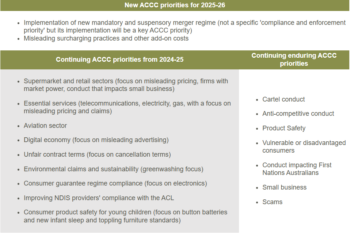ACCC 2025-26 Compliance and Enforcement Priorities: Broadly similar to last year plus focus on new merger regime and surcharges
Market Insights
Key takeaways
Key takeaways from the ACCC’s 2025-26 enforcement priorities1 are as follows:
- The ACCC’s 2025-26 enforcement priorities are broadly similar to its 2024-25 priorities, but with important refinements to some existing categories plus a new focus on misleading surcharging practices and other add-on costs.
- Implementation of Australia’s new mandatory and suspensory merger regime, which will apply to acquisitions of shares or assets that meet certain thresholds and are put into effect from 1 January 2026, will be a key ACCC priority (albeit not listed as a specific ‘compliance and enforcement priority’).
- The ACCC’s focus on supermarkets, retail, aviation, essential services (including telecommunications, gas and electricity) and the digital economy will continue in 2025-26.
- Unfair contract terms compliance will remain a priority following the introduction of new penalties in November 2023, with a particular ACCC focus on harmful cancellation terms, automatic renewal clauses, early termination fee clauses and non-cancellation clauses.
- The ACCC will continue to focus on and investigate environmental and sustainability claims (including ‘greenwashing’), consumer guarantees (particularly in relation to electronics), Australian Consumer Law (ACL) compliance by NDIS providers, and product safety for young children (including button batteries and new infant sleep and toppling furniture standards).
- Other potential areas for reform to watch in the coming year include the ACCC continuing to advocate for a new prohibition on ‘unfair trading practices’, as well as further consideration of proposed new penalties for failure to comply with the consumer guarantees regime.
At first glance, the ACCC’s 2025-26 enforcement priorities look very similar to its 2024-25 priorities and reflect an ongoing focus on sectors and conduct that significantly impact costs of living and doing business, as well as the ongoing effects of digital transformation and environmental claims.
However, on closer inspection, there are some key refinements to the existing categories, as well as new focuses on Australia’s mandatory and suspensory merger regime and misleading surcharges and other costs, which we have commented on below.
Snapshot of ACCC enforcement priorities for 2025-26

Australia’s new merger regime
Australia’s new mandatory and suspensory merger regime will apply to acquisitions of shares or assets that meet certain thresholds and are put into effect after 1 January 2026 (for more information on this important development please see our previous article here).
While the new merger regime does not expressly feature in the ACCC’s 2025-26 enforcement priorities, ACCC Chair Gina Cass-Gottlieb made it clear in her speech announcing the priorities2 that implementing and promoting compliance with the new merger regime, including taking enforcement action where necessary, will be a significant focus for the ACCC in 2025-2026.
Although the new merger laws have already been passed by Parliament, a number of crucial details in relation to the application of the regime are yet to be finalised. Ms Cass-Gottlieb indicated that the ACCC will be releasing guidelines on transitional arrangements for the new merger regime in the coming weeks and also expects to commence public consultation on draft process and analytical guidelines before the end of March 2025.
Misleading surcharging practices and other add-on costs
The only brand-new addition to the ACCC’s enforcement priorities this year is misleading surcharging practices and other add-on costs, noting the Australia’s government’s allocation of $2.1 million in new funding to the ACCC in 2024 in this area. Ms Cass-Gottlieb indicated that the ACCC will focus on increasing compliance with the excessive card payment surcharging prohibition, as well as improving pricing practices to ensure that all add on costs are appropriately disclosed.
Ongoing focus on supermarkets and retail, essential services and aviation sectors
The ACCC has maintained its existing focus on competition and consumer law in the following sectors and conduct which the ACCC considers can significantly impact costs of living and doing business:
- Supermarket and retail: the ACCC’s prioritisation of the supermarket sector will continue but will be expanded to include the broader retail sector, particularly in relation to misleading pricing practices, firms with market power and conduct that impacts small businesses. This follows the ACCC’s 2024 inquiry into pricing, competition and emerging issues in the supermarket sector (with a final report to be provided to the government in the near future), as well as the Australian government allocating $30 million to the ACCC in 2024 for dedicated investigations and enforcement in the supermarket and broader retail sectors;
- Essential services: the ACCC has carried over its 2024-25 enforcement priority of competition and consumer issues in essential services to the year ahead, with a particular focus on competition issues in relation to the telecommunications, electricity and gas sectors, as well as misleading pricing and claims in this area; and
- Aviation: the ACCC will continue to remain active in monitoring and enforcing competition and consumer law compliance in the aviation sector in 2025-26, noting recent changes to the domestic competitive landscape in Australia following the collapse of Bonza airlines and the withdrawal of Rex services from metropolitan routes.
Digital economy
The ACCC will continue to investigate competition and consumer law issues in the digital economy, with a focus on misleading or deceptive advertising within influencer marketing, online reviews, in-app purchases and unsafe consumer products. The ACCC will also work with Treasury towards implementing its proposed new digital competition regime.
Unfair contract terms
Significant penalties for contraventions of the unfair contract terms (UCT) regime in the ACL have been in effect since November 2023.3 While the ACCC is yet to commence any proceedings for alleged contraventions of the UCT penalty regime, the ACCC has indicated that it will continue to prioritise this area, with a particular focus on harmful cancellation terms, automatic renewal clauses, early termination fee clauses and non-cancellation clauses.
Environmental claims and sustainability
False, misleading or deceptive environmental and / or sustainability claims (often referred to as ‘greenwashing’) have been a key concern of both the ACCC and ASIC for a number of years, as companies continue to strive towards net zero. Ms Cass-Gottlieb indicated in her speech that the ACCC has several ongoing investigations into potential greenwashing claims, and that the ACCC will continue to target greenwashing conduct aimed at consumers in a range of sectors including energy, food, fashion and homewares.
In addition, in December 2024, the ACCC released its final guide on sustainability collaborations, which seeks to assist businesses considering working together to achieve positive sustainability outcomes, including the potential for ACCC authorisation.4
Consumer guarantees
The ACCC will again focus on improving industry compliance with consumer guarantees under the ACL, with a particular on consumer electronics. This is an important space to watch, as there are some potential reforms on the horizon relating to potential new penalties for the consumer guarantee regime under the ACL (see also further below).
NDIS providers
The ACCC will continue to prioritise improving compliance by NDIS providers with their obligations under the ACL. This follows recent ACCC proceedings against Ausnew Home Care Services, an NDIS provider, for alleged misleading representations in selling aged care and disability products.
Consumer product safety issues for young children
Last year, the ACCC’s enforcement priorities included consumer product safety issues for young children. This year, the ACCC’s focus in this area will be compliance with button battery standards and raising awareness about new infant sleep and toppling furniture standards.
Enduring ACCC priorities
In addition to announcing the 2025-26 priorities, Ms Cass-Gottlieb confirmed that the ACCC will continue to maintain the following existing enduring priorities:
- cartel conduct (noting that the ACCC recently commenced proceedings against Ventia, Spotless and certain executives in relation to alleged price fixing conduct in the supply of services to the Department of Defence, and has also indicated that it has ‘several well advanced investigations spanning a range of important sectors’);
- anti-competitive conduct (including misuse of market power);
- product safety;
- consumers experiencing vulnerability or disadvantage;
- conduct impacting First Nations consumers;
- small business protection; and
- scams.
Other potential areas of reform to the Australian Consumer Law
Other potential areas of reform to the ACL which remain on the horizon include the following:
- while not specifically mentioned in the ACCC’s 2025-26 enforcement priorities, Ms Cass-Gottlieb indicated in her speech announcing the priorities that the ACCC will continue to advocate for a new prohibition on unfair trading practices, which the ACCC considers is necessary to ‘close the gap in Australia’s current consumer laws’. It is still unclear what form the proposed prohibition on unfair trading practices would take, as the Australian government only recently completed consultation in respect of the proposal;5 and
- in late 2024, the Australian government engaged in a separate consultation process in relation to potential new penalties for suppliers and manufacturers who do not comply with the consumer guarantee regime.6
How can we help?
We have a specialist competition and consumer law team that has considerable experience in all matters relating to competition and consumer law. If you would like more information about the services we provide, please contact us.
This article was written by David Fleming, Partner, and Alexander Shepherd, Senior Associate.
1 See ACCC enforcement priorities 2025-26: https://www.accc.gov.au/about-us/accc-priorities/compliance-and-enforcement-priorities
2 See ACCC’s compliance and enforcement priorities update 2025-26 address | ACCC (20 February 2025).
3 Read more about the significant changes to the UCT which are now in effect here: https://hwlebsworth.com.au/new-unfair-contract-terms-laws-and-increased-penalties-passed-by-senate/
4https://www.accc.gov.au/media-release/accc-releases-final-guide-on-sustainability-collaborations
5 https://treasury.gov.au/consultation/c2024-602157
6 https://treasury.gov.au/consultation/c2024-583535
Subscribe for publications + events
HWLE regularly publishes articles and newsletters to keep our clients up to date on the latest legal developments and what this means for your business. To receive these updates via email, please complete the subscription form and indicate which areas of law you would like to receive information on.
* indicates required fields
